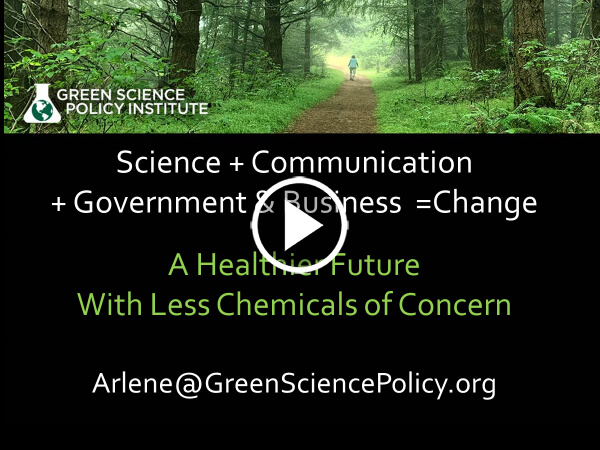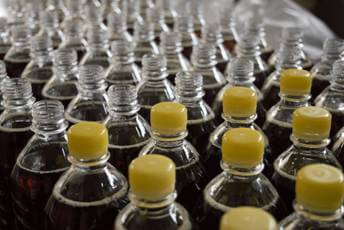December 2020 : Can Biden and the EU Tackle Toxics Together?
In this edition:
- Help us improve our newsletter and win a prize
- The Fossil Fuel to Breast Cancer Pipeline
- PFAS-free Holiday Shopping
- Flame retardant-free climbing
- Seabird Sentinels
- Calendar
We hope you had a safe and relaxing Thanksgiving holiday following an especially contentious presidential election and a challenging year overall. We are eager to see how the Biden administration will tackle toxics.
One promising sign is that Biden campaigned on reducing PFAS pollution by designating PFAS as a hazardous substance, supporting government purchasing of PFAS-free products, setting legal limits for PFAS in drinking water, and more. We hope that under Biden’s leadership the United States will at long last ratify international efforts to limit chemical harm such as the Stockholm and Rotterdam Conventions.
I was reminded of the importance of global efforts to address toxic pollution this week, when I had the honor of presenting the opening keynote lecture and also the concluding remarks to 685 participants from 27 countries at a PFAS conference organized by the German government. You can watch my short strategy and communication talk here or by clicking the image below. My opening keynote, "Reducing Harm from PFAS for a Healthier Environment,” can be found here. A recording of this entire meeting will be available here until the end of 2020.
I came away inspired by the European nations’ cooperation and visionary chemicals strategy which aims to reduce toxic pollution to zero. We will share the EU example as we work with key House and Senate staff and the new administration to tackle toxics.
For more global energy and inspiration, be sure to check out the recording of this week’s Goldman award ceremony.
Each year, the Goldman Environmental Prize recognizes six leaders from the six continents who are taking extraordinary action to protect our natural environment, often at great personal risk. Usually this moving event is limited to ticket holders, but you can view a livestream, hosted by Sigourney Weaver, of this week's inspirational award ceremony here.
If you missed them, check out Liza Gross’s three-part New York Times series on the impact of toxic chemical classes on children. The article about flame retardants in baby products includes my work to remove Tris from children’s pajamas in the 1970s as well as our Institute's chemical detective work with Heather Stapleton to stop the use of toxic flame retardants. “The solution isn’t another chemical, but a different way of designing a product or a different regulation,” I conclude to Liza. Previous articles discuss phthalates and fertility and PFAS exposure during pregnancy — including a quote from Rebecca Fuoco, our science communications officer who recently had a baby.
The film Dark Waters about attorney Rob Bilott’s battle against PFAS pollution is still having an impact a year after its premiere. Participant, the film’s production company, has won a Shorty Award for the #FightForeverChemicalsCampaign it led with the rollout of the movie. We are proud of our contributions—including writing the Q&A for the film’s website--to inform decision makers and the public about the harms of PFAS.
Working with business, government, scientists and NGOs worldwide, our Institute plans to redouble our efforts to reduce the use of Six Classes in 2021, and we look forward to sharing our successes with you.
For your holiday giving, please consider supporting us here.
Warm regards for a happy holiday season and better 2021,
Arlene and the Green Science Policy team
P.S. Our Institute has an open position for a Science and Policy Associate to help us work towards reduced toxics in a healthier world. Learn more on our jobs page.
Help us improve our newsletter and win a prize
Thank you so much for being a subscriber to the Green Science Policy Institute’s monthly e-newsletter. For more than a decade, our newsletter has provided new and useful information about chemicals of concern, science, policy, and protecting health. Now we want to make our newsletter even more accessible, interesting, and relevant to you. Might you fill out the quick survey here to help us do that?
As a thank you, participants will be entered into a raffle to win a goody bag including some of our favorite books and chocolates.
The Fossil Fuel to Breast Cancer Pipeline
By Carol Kwiatkowski
Have you ever wondered where environmental contaminants come from? Are they synthesized in a lab? Sourced from the jungle? In fact, most chemicals we consider environmental pollutants originate with the extraction of fossil fuels, through processes such as hydraulic fracturing. Chemicals are retrieved from the bowels of the earth, then separated, refined, and processed in large industrial complexes. Currently, one of the most profitable uses of these chemicals is for plastics used in countless consumer products.
Unfortunately, we are then exposed to these toxics in our homes and workplaces. Numerous hormone-related adverse health effects are associated with plastic additives such as bisphenols and phthalates. Altered breast development and breast cancer are two such effects, with windows of vulnerability to hormone disrupting chemicals occurring during prenatal development, puberty, and pregnancy. A recent review describes multiple lines of research linking low-dose exposure to bisphenol A with increased breast cancer risk. To hear more about how fracking, plastics, and breast cancer are connected, listen to my interview on Breast Cancer Action’s recent podcast.
PFAS-free Holiday Shopping
By Rebecca Fuoco
All finished with your holiday shopping this year? Me neither. The good news is that our PFAS-free products list has some excellent gift ideas. From rain jackets for your outdoorsy cousin to make-up for your glamorous sister, our webpage has options that are made without these harmful forever chemicals.
When you buy PFAS-free gifts, you’re not just protecting your loved ones, you’re also rewarding companies for making the responsible decision to avoid the entire class of PFAS.
This is known as “voting with your wallet,” and it can help shape market trends that encourage other companies to follow suit.
To reduce PFAS in our homes and environment, we need to stop PFAS at its source: in products. While our Institute and others work to shape government and business policies to turn off the PFAS tap, don’t underestimate your power as a consumer.
Flame retardant-free climbing
By Tom Bruton
What do gymnastics and rock climbing have in common? Participants in both sports like to push their limits, and they rely on foam padding to break their falls. Previous research has found that gymnasts have above average levels of the flame retardant pentaBDE in their blood, and higher levels of this harmful chemical on their hands after practice than before. The likely explanation is that pentaBDE was added as a flame retardant to the polyurethane foam used to safely cushion falls in gyms.
Indoor rock climbing gyms are wildly popular here in the Bay Area (at least, prior to the pandemic), and we wondered whether their wall-to-wall foam padding could also be a source of exposure to harmful flame retardants. To find out, we collected samples from foam pads at four local climbing gyms and sent them for testing at the Duke University Foam Project. We also sent samples of foam from two portable climbing crash pads. The results? Eight of our nine samples did not contain any of the flame retardants that Duke tests for. One sample came back positive for the flame retardant chlorinated Tris or TDCPP. While our sample size was small, these results suggest that climbing pads do not (or no longer) commonly contain flame retardants. Good news for all of us who enjoy clinging to the side of a crag!
Seabird Sentinels
By Rebecca Fuoco
Like canaries in coal mines, birds can warn us of toxic threats in our environment. In the case of per- and polyfluorinated substances (PFAS), seabirds are proving that these “forever chemicals” live up to their name.
A recent study from Rainer Lohmann and Anna Robuck at the University of Rhode Island found high levels of both old and new PFAS in seabirds from offshore Massachusetts and coastal Rhode Island and North Carolina.
The scientists detected the chemicals at concentrations that threaten the birds’ ability to reproduce, migrate, and raise their young successfully.
Especially concerning was the discovery that perfluorooctanesulfonic acid (PFOS), which has not been produced since the early 2000s, was the most common PFAS detected. This is disturbing but not surprising, since we know the structure of PFAS chemicals makes them extremely persistent.
Worse, the study’s detection of new PFAS compounds created to replace PFOS shows that we’re repeating this mistake over and over again. The consequences will reverberate through multiple ecosystems and generations.
In their op-ed for The Hill, the study’s authors note that there’s “no mitigation in sight” for PFAS already in the environment. The best hope is to stop using the entire class of PFAS chemicals in the first place, since “we cannot put the nightmarish genie back in the bottle.”
The EU's new chemicals strategy which aims to phase out all non-essential uses of PFAS is enormous progress in that direction. Our recent paper on managing PFAS as a class should help -- the paper has been downloaded more than 25,000 times and is the most read article in ES&T letters right now.
Calendar
Until December 31: PFAS Conference in Berlin can be viewed online
The informative and inspirational November 30 to December 1 international PFAS conference, Dealing with Contaminants of Emerging Concern, sponsored by the German Environment Agency and the German Ministry for the Environment, can be viewed until the end of December at www.bmu.de/pfas. Arlene Blum presented the opening keynote talk entitled: "Reducing Harm from PFAS for a Healthier Environment”, shared our Institute’s communication strategy and moderated the concluding panel on “The Way Forward”.
December 8: PFAS in Food Packaging Webinar
When: 10:00 am PST Join Massachusetts Breast Cancer Coalition (MBCC) for a panel discussion with Arlene Blum, PhD, Maricel Maffini, PhD, and Laurel Schaider, PhD on the prevalence of PFAS in food packaging, current regulations, how states and retailers are responding, and what you can do to reduce your exposure. Dr. Jill Oxley, breast cancer surgeon and MBCC Board Member, will serve as moderator. You can register free of charge here.
Goldman Environmental Prize 2020 Award Ceremony
The Goldman Environmental Prize is the Nobel prize for environmental work, honoring grassroots activists from the six continents. Usually this moving event can only be viewed by a limited number of ticket holders--our favorite event of the year! This year's inspirational event was a beautiful and moving livestream hosted by Sigourney Weaver. Please do take a break and enjoy it here.
Receive Updates By Email
Subscribe to our monthly newsletter and get these updates delivered right to your inbox!





